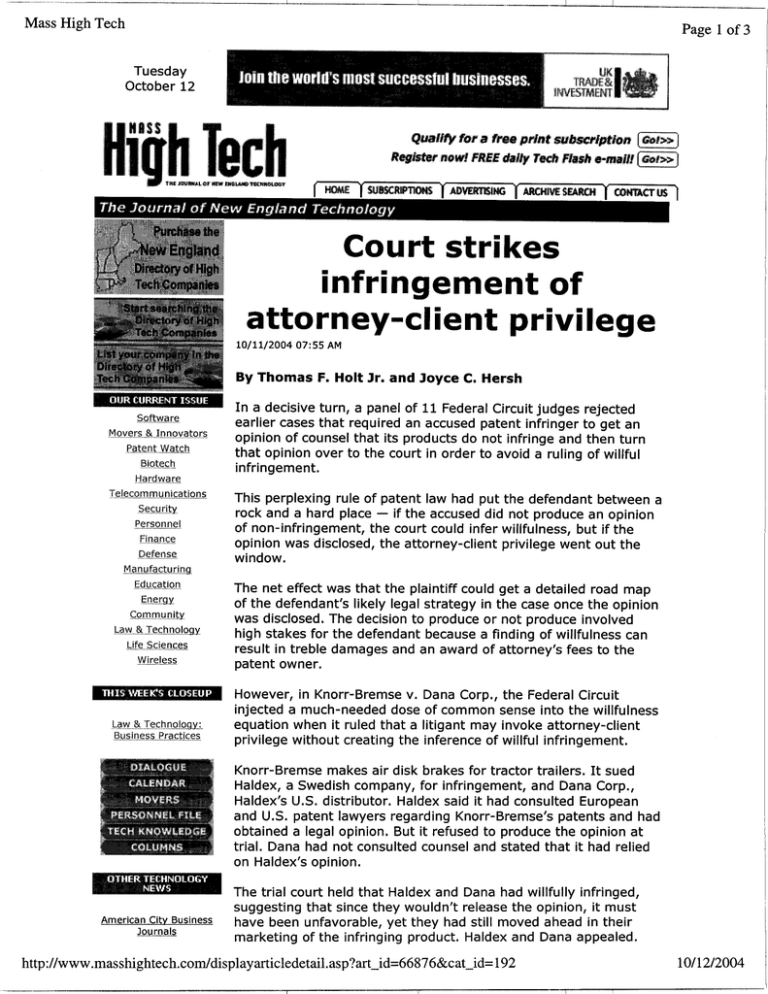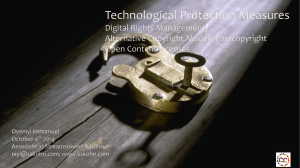
1
Mass High Tech
Page 1 of 3
Tuesday
October 12
The Journal of New England' Technology
Purchase the
New England
Directory of High
Tech Companies
4 1
Start searching ; the
.,,Directory of High
Toch companies
Court strikes
infringement of
attorney-client privilege
10/11/2004 07 :55 AM
List your company In the
Directory of High 0
Tech Compani es -:,
OUR CURRENT ISSUE
Software
Movers..& .J.D .o.va.tors
Patent Watch
Biotech
Hardware
Telecommunications
Security .
Personnel
Finance
©efe .n .se.
Manufacturing
Education
EC?er9.y
Cainmu.nity
L[~w_&Technology
Life Sciences
Wireless
THIS VIE
S CLOSEUP
Law & Techn olo gy_:.
Business Practices
By Thomas F . Holt Jr. and Joyce C . Hersh
In a decisive turn, a panel of 11 Federal Circuit judges rejected
earlier cases that required an accused patent infringer to get an
opinion of counsel that its products do not infringe and then turn
that opinion over to the court in order to avoid a ruling of willful
infringement .
This perplexing rule of patent law had put the defendant between a
rock and a hard place - if the accused did not produce an opinion
of non-infringement, the court could infer willfulness, but if the
opinion was disclosed, the attorney-client privilege went out the
window .
The net effect was that the plaintiff could get a detailed road map
of the defendant's likely legal strategy in the case once the opinion
was disclosed . The decision to produce or not produce involved
high stakes for the defendant because a finding of willfulness can
result in treble damages and an award of attorney's fees to the
patent owner .
However, in Knorr-Bremse v . Dana Corp ., the Federal Circuit
injected a much-needed dose of common sense into the willfulness
equation when it ruled that a litigant may invoke attorney-client
privilege without creating the inference of willful infringement .
Knorr-Bremse makes air disk brakes for tractor trailers . It sued
Haldex, a Swedish company, for infringement, and Dana Corp .,
Haldex's U .S . distributor. Haldex said it had consulted European
and U .S . patent lawyers regarding Knorr-Bremse's patents and had
obtained a legal opinion . But it refused to produce the opinion at
trial . Dana had not consulted counsel and stated that it had relied
on Haldex's opinion .
,
J .TECHNOLOGY
NEWS
American City Business
Journals
The trial court held that Haldex and Dana had willfully infringed,
suggesting that since they wouldn't release the opinion, it must
have been unfavorable, yet they had still moved ahead in their
marketing of the infringing product . Haldex and Dana appealed .
http ://www .masshightech .com/displayarticledetail .asp?art id=66876&cat id=192
10/12/2004
Mass High Tech
Page 2 of 3
(news from 41 Business
publications around the
country)
OTHER USEFUL
LINKS
Not surprisingly, the patent world has anxiously awaited the
outcome of the appeal . The practice of inferring willful
infringement, and the resulting tripling of damages, has been of
concern to businesspeople and their lawyers alike .
A formal, full-blown legal opinion can cost upward of $50,000 prohibitively expensive for small companies, and large companies
as well if numerous patents are to be analyzed . In-house lawyers
wondered if they would have to produce a written opinion backing
up every review of a competitor's patent .
If the inference were upheld, a company could still find itself liable
for triple damages even though it had honestly tried to avoid
infringing a patented invention . The adverse inference was a
potentially potent weapon in forcing cash settlements to avoid the
risk of treble damages .
The full complement of the Federal Circuit addressed these issues
by answering three key questions posed by the defendants' appeal .
First, when the attorney-client and work-product privilege is
invoked by a defendant in an infringement suit, is it appropriate to
infer willful infringement? The answer is no . According to the
Federal Circuit, one has a duty to respect the law, but willful
infringement cannot be inferred from invoking attorney-client or
attorney work-product privilege . The court concluded that it was
against public policy to infer willfulness from failure to produce a
document protected by attorney-client privilege .
The Federal Circuit was plainly swayed by the Supreme Court
rulings that describe the attorney-client privilege as "the oldest of
the privileges for confidential communications known to common
law," and stress the importance of the public purpose of
encouraging full and frank communication between attorneys and
their clients . Attorney-client privilege recognizes that sound legal
advice serves the public and that such advice depends upon the
lawyer's being fully informed by the client .
The court went on to say that "the inference that withheld opinions
are adverse to the client's actions can distort the attorney-client
relationship, in derogation of the foundations of that relationship ."
Second, if the defendant did not obtain legal advice, is it
appropriate to infer willful infringement? The answer here is also
no . A party has an "affirmative duty of due care to avoid
infringement of the known patent rights of others," but failure to
consult a lawyer is not a reason to infer that infringement was
willful . As a result, failure to seek an exculpatory opinion, standing
alone, is not enough to trigger the inference of willfulness .
Third, should the existence of a substantial defense to infringement
be enough to defeat liability for willful infringement even if no legal
advice has been secured? The Federal Circuit answered this in the
negative as well . However, the court refused to adopt a hard rule
either way on this point, instead saying that the existence of a
defense to an accusation of infringement was merely one factor to
be considered along with others in deciding whether a prudent
person would have had a good reason to believe that they were not
infringing a patent, or that the patent was invalid or unenforceable .
http ://www .masshightech.com/displayarticledetail .asp?art id=66876&cat id=192
10/12/2004
Mass High Tech
Page 3 of 3
In other words, an accused infringer may still be hit with willfulness
even without the adverse inference under pre-Knorr-Bremse law .
The question remains : Should companies still seek an opinion of
counsel when their products sail close to the wind of a competitor's
patent? The short answer is no . But it may still make sense to get a
solid opinion of non-infringement and use it at trial, when other
circumstantial evidence of reasonable good faith on the part of the
accused infringer is weak .
The Federal Circuit did not spell out what evidence that a targeted
company will need to muster in the defense of an opinion, instead
leaving it to the specific facts of each case . Nevertheless, KnorrBremse makes it clear that the attorney-client privilege is now alive
and well in patent law .
Thomas Holt is a partner and Joyce Hersh is an associate in the
Boston office of Kirkpatrick & Lockhart LLP .
EMAIL ARTICLE TO A FRIENO . .
H.o..me. I Su . .bscri .ptions.I Conta. .ct.. .Us I Ad. .v arti .s .i n.g
All Rights Reserved . Mass High Tech 2000
P.rivacy.. .Pol. .icy. I U..se.r . .Agreeme.nt.
http ://www .masshightech .com/displayarticledetail .asp?art_id=66876&ca t id=192
10/12/2004

